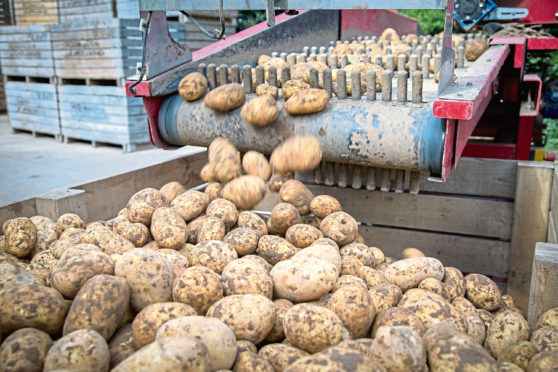Potato growers and traders will get the chance next month to vote for or against continuing to pay a statutory levy to AHDB for the tattie sector.
The vote on the continuation of the collection of a potato sector levy by the Agriculture and Horticulture Development Board (AHDB) comes in the midst of a fiercely argued debate between those who think the levy is a waste of money and others who say it pays for the technology future on which the sector is based.
Leading anti-levy campaigner John Bratley, farming in Lincolnshire, believes just about everything AHDB Potatoes does is “already out there”, being freely available on the world scene, courtesy of commercial companies.
He also argues AHDB’s overheads are “10 times too much”.
AHDB chairman Nicholas Saphir disagrees, arguing commercial businesses don’t supply farmers in any sector with advice and information unless it is “very commercially attractive” for them to do so.
Faced with the claim that the commercial world will “step up” in the event of AHDB Potatoes losing its levy, he added: “I’m afraid that in many instances it won’t.”
From February 17, growers and traders will have four weeks to vote in a national ballot on the levy question, instigated in response to a request for a vote from 176 UK levy-paying potato growing or buying businesses.
AHDB Potatoes’ sales pitch, stated on the organisation’s website, lists various annual achievements.
These include investing £500,000 a year in storage research, spending £300,000 a year on crop protection research, and educating more than five million primary school children through its Grow Your Own Potatoes programme.
Mr Bratley, who grows up to 690 acres of potatoes a year, questioned these achievements.
He said most growers don’t have dedicated storage, that promotional money would be better spent educating consumers how to cook potatoes rather than how to grow them, and that crop protection research is already widely and freely available on a worldwide basis.
“I certainly don’t need to commit my money to this organisation to do the promotion,” said Mr Bratley, applying similar thinking to other parts of his business.
“I pay £12,000 to £14,000 to AHDB each year, but still pay £1,500 a year to an independent consultant for pricing and market information because the input I get from him is simply better than I get from AHDB.”
The counter argument from Mr Saphir is equally strong, particularly on storage.
He said: “If you’re a grower who sells direct into the marketplace and only keeps product in an ambient store until Christmas, you might think our work isn’t relevant to you. Well it is, given that the bulk of the British crop does go into long-term storage.
“You may think our storage work isn’t relevant to you individually, but it’s relevant to the total supply chain, which definitely is relevant to your business.”
The AHDB chairman also highlighted the “enormous challenge” facing growers and traders in terms of the climate, chemical usage, soil quality, and energy issues.
He said: “All these things will need to be met with the latest advances in technology, which is what AHDB Potatoes is committed to providing.”
The pro and anti-levy camps are also sharply divided on the overheads question.
Mr Bratley puts the figure at 40% while Mr Saphir said it was 12% for AHDB Potatoes, based on support costs and other expenditure amounting to £984,000, out of total income of £7.2m.
Mr Saphir added: “It’s also misinformation to say voting in favour of the levy continuing means growers will keep paying for the rest of their business life.
“As with the current vote, you only need 5% of growers to request a ballot, at any time.
“In addition, our new change and strategy paper, which is currently out to consultation, includes the idea of a regular ballot being held across the whole of AHDB every five years.”
The debate over whether or not to continue with a potato sector levy comes during a ballot on the future of the horticulture levy.
Fruit, vegetable and flower growers have until February 10 to decide on whether they want to continue paying a statutory levy for the horticulture sector to AHDB.
